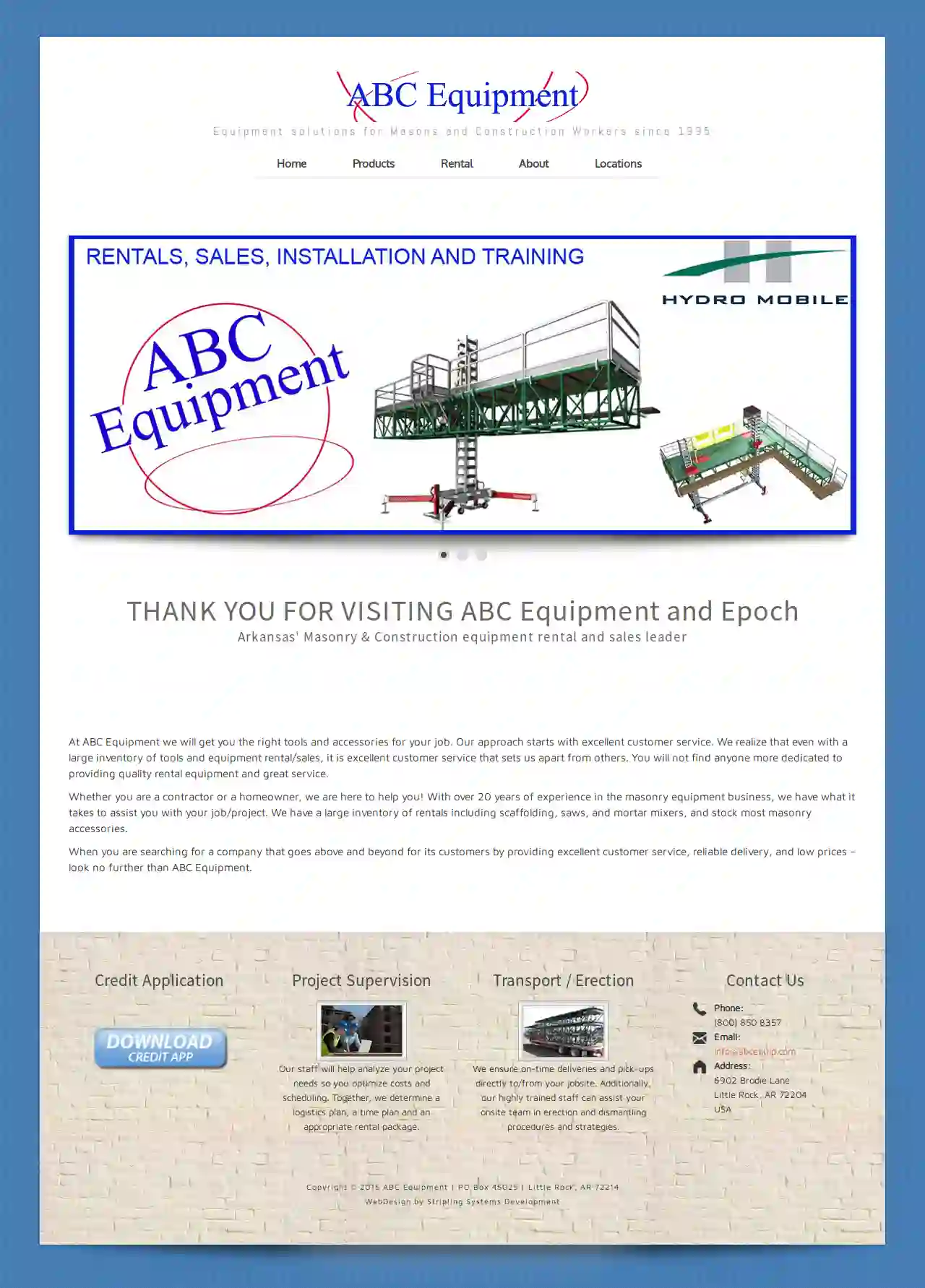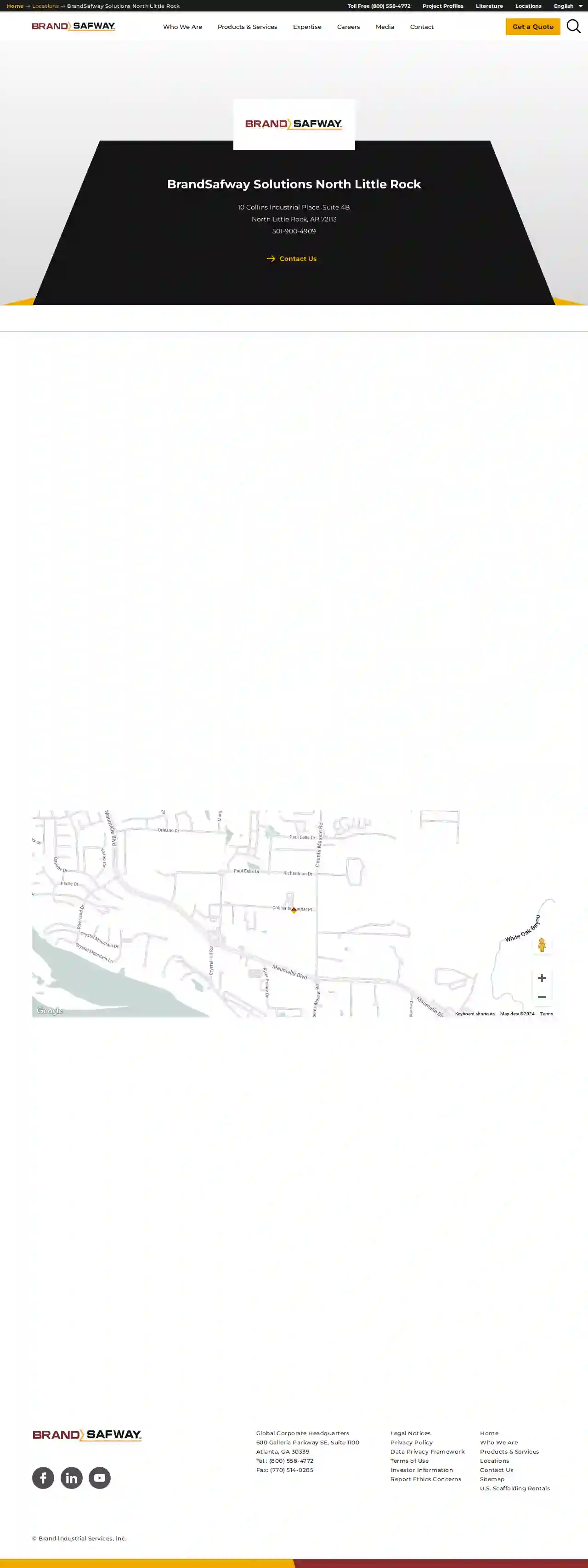Scaffolding Companies Blytheville
Find Scaffolding Specialists in Blytheville
Get 3 FREE Scaffolding Contractors quotes for your project today! Compare profiles, reviews, accreditations, portfolio, etc... and choose the best offer.

ABC Equipment
4.19 reviews6902 Brodie Lane, Little Rock, 72204, USABC Equipment: Your Partner in Masonry & Construction Since 1995, ABC Equipment has been a trusted provider of equipment solutions for Masons and Construction Workers in Arkansas. We understand the importance of having the right tools for the job, and we're committed to providing our customers with the highest quality equipment and exceptional customer service. Our team is dedicated to helping you succeed. We offer a wide range of rental equipment, including scaffolding, saws, mortar mixers, and a variety of masonry accessories. We also provide project supervision, transportation, and erection services to ensure your project runs smoothly. Whether you're a seasoned contractor or a homeowner tackling a DIY project, ABC Equipment is here to support you. We're proud to offer competitive prices, reliable delivery, and a commitment to exceeding your expectations. We're more than just an equipment rental company; we're your partners in success. Contact us today to learn more about how we can help you achieve your project goals.
- Services
- Why Us?
- Gallery
Get Quote
BrandSafway Solutions North Little Rock
North Little Rock, AR, 1234 Industrial Blvd, 72118, USBrandSafway is a leading provider of access solutions, including scaffolding, aerial work platforms, and forming and shoring. With a strong commitment to safety, quality, and customer satisfaction, BrandSafway offers a wide range of services tailored to meet the unique needs of clients across various industries. Their team of experienced professionals is dedicated to delivering innovative solutions that enhance efficiency and productivity, ensuring successful project outcomes.
- Services
- Why Us?
- Accreditations
- Our Team
- Testimonials
Get Quote- Un
Universal Scaffolding & Equipment
4.33 reviewsLittle Rock, US- Services
- Why Us?
Get Quote - Un
Universal Dock & Door
Little Rock, US- Services
- Why Us?
Get Quote
Over 2,353+ Scaffolding Contractors on our platform
Our scaffolding contractors operate in Blytheville & beyond!
ScaffoldingHQ has curated and vetted the Best Scaffolding Contractors in Blytheville. Find the most reliable contractor today.
Frequently Asked Questions About Scaffolding Companies
- Mobile Elevated Work Platforms (MEWPs): Scissor lifts, boom lifts, and other MEWPs offer flexible access for specific tasks.
- Mast Climbing Work Platforms (MCWPs): Ideal for high-rise construction, providing a stable working platform that can be raised incrementally.
- Suspended Access Equipment: Ropes and harnesses used for specific tasks like window cleaning or façade repairs.
- Ladders and Step Ladders: For shorter durations and limited working heights, provided they are used safely and appropriately.
- Size and Complexity: Larger, more intricate scaffolding structures will naturally take longer to assemble.
- Scaffolding Type: System scaffolding, with its pre-engineered components, can be erected faster than traditional tube and clamp scaffolding.
- Accessibility: Difficult site access or limited working space can prolong the erection process.
- Crew Size and Experience: The number and skill level of the scaffolding erectors will impact the speed of assembly.
- Hire Professionals: Just like erection, dismantling should be done by qualified and experienced scaffolding erectors.
- Reverse the Erection Process: The dismantling process should generally follow the reverse order of erection.
- Clear the Area: Ensure the area below is free from people and obstacles.
- Lower Materials Safely: Use ropes or other safe methods to lower dismantled components to the ground.
- Inspect Components: As components are removed, inspect them for damage and store them properly for future use.
- Communicate with the Scaffolding Company: Clearly express your concerns about potential damage to landscaping, structures, or utilities.
- Clear the Area: Remove any valuable or fragile items from the work zone.
- Protect Landscaping: Cover plants, shrubs, and lawns with tarps or protective sheeting.
- Mark Underground Utilities: Ensure underground utilities (water lines, electrical cables) are marked and avoided during installation.
- Supervision: If possible, be present during erection and dismantling to monitor the process.
What are some alternatives to traditional scaffolding?
How long does it take to erect scaffolding?
How do I dismantle scaffolding safely?
How do I protect my property from damage during scaffolding erection and dismantling?
What are some alternatives to traditional scaffolding?
- Mobile Elevated Work Platforms (MEWPs): Scissor lifts, boom lifts, and other MEWPs offer flexible access for specific tasks.
- Mast Climbing Work Platforms (MCWPs): Ideal for high-rise construction, providing a stable working platform that can be raised incrementally.
- Suspended Access Equipment: Ropes and harnesses used for specific tasks like window cleaning or façade repairs.
- Ladders and Step Ladders: For shorter durations and limited working heights, provided they are used safely and appropriately.
How long does it take to erect scaffolding?
- Size and Complexity: Larger, more intricate scaffolding structures will naturally take longer to assemble.
- Scaffolding Type: System scaffolding, with its pre-engineered components, can be erected faster than traditional tube and clamp scaffolding.
- Accessibility: Difficult site access or limited working space can prolong the erection process.
- Crew Size and Experience: The number and skill level of the scaffolding erectors will impact the speed of assembly.
How do I dismantle scaffolding safely?
- Hire Professionals: Just like erection, dismantling should be done by qualified and experienced scaffolding erectors.
- Reverse the Erection Process: The dismantling process should generally follow the reverse order of erection.
- Clear the Area: Ensure the area below is free from people and obstacles.
- Lower Materials Safely: Use ropes or other safe methods to lower dismantled components to the ground.
- Inspect Components: As components are removed, inspect them for damage and store them properly for future use.
How do I protect my property from damage during scaffolding erection and dismantling?
- Communicate with the Scaffolding Company: Clearly express your concerns about potential damage to landscaping, structures, or utilities.
- Clear the Area: Remove any valuable or fragile items from the work zone.
- Protect Landscaping: Cover plants, shrubs, and lawns with tarps or protective sheeting.
- Mark Underground Utilities: Ensure underground utilities (water lines, electrical cables) are marked and avoided during installation.
- Supervision: If possible, be present during erection and dismantling to monitor the process.